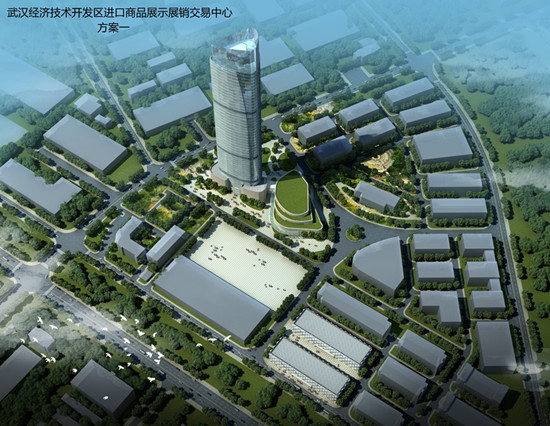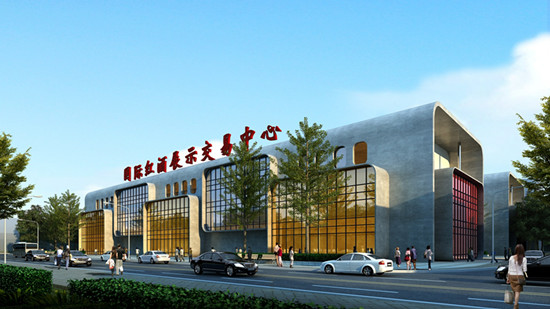

Wuhan Export Processing Zone (Wuhan EPZ) was established on April 27, 2000, in Wuhan Economic & Technological Development Zone (Hannan), referred to as the WEDZ, approved by the State Council as one of the first 15 pilots in China.
The zone has an area of 1.01 square kilometers. Located in the hinterland of the WEDZ, it faces Chechengnan Road, Zhushanhu Avenue, Dongjinghe Road and Dongfeng Avenue in four directions.
In 2018, WEDZ's Comprehensive Bonded Zone was established under the approval of the State Council.
The comprehensive bonded zone was integrated and optimized from the former Export Processing Zone, which was one of the first batch of export processing zones in China and the first in Central China.
The comprehensive bonded area is a special customs supervision area with the highest operational levels, the most preferential policies, the most complete functions and the simplest procedures in the country, except for those of the free trade areas.
The original export processing zone was dominated by bonded processing and bonded logistics functions and was at the lowest end of the added value of the industrial supply chain.
After upgrading to a comprehensive protection zone, the zone now has more complete functions and more complete policies.
The zone can perform R & D, testing and sales functions, extend to both ends of industry – as well as enhance added values and superimpose functions such as bonded services and international trade -- which can drive the development of local export-oriented economies.
Moving forwards, the comprehensive bonded zone will leverage the advantages of its resources -- such its proximity to a nearby trillion-yuan automobile industry cluster, the Wuhan cross-border e-commerce comprehensive test zone and the international shipping center in the middle reaches of the Yangtze River.
By so doing, it will expand its international re-export trade, international procurement distribution and distribution functions – as well as international transit, testing and after-sales service maintenance and R & D operations -- among others.
Infrastructure
The EPZ is equipped with well-developed infrastructure, including double-source water supply, double-circuit power supply, gas, steam, communications, roads, railways and drainage.
It also has 8,000-square-meter customs acceptance warehouses, 12,000-square-meter inspection sites and platforms, and 70,000-square-meter standard factory buildings.
Transportation
The zone is close to Wuhan's ring roads and ring expressways, four railways (Hankou-Danjiangkou, Beijing-Kowloon, Wuchang-Jiujiang, and Beijing-Guangzhou) and six expressways (Beijing-Hong Kong-Macau, Fuzhou-Yinchuan, Shanghai-Chengdu, Shanghai-Chongqing, Wuhan-Jianli and Shanghai-Wuhan).
The nearby Yangtze River provides linkage to rivers and lakes in central China constitutes a wide-coverage transport network.
Wuhan National Auto and Parts Export Base
The base was set up in the EPZ in 2006 as one of the first auto export bases approved by the Ministry of Commerce and the National Development and Reform Commission. It ranked third nationwide in 2011 in an expert assessment by the two ministries.
Industrial upgrade
The EPZ was assigned with more functions -- bonded warehousing, logistics, maintenance and research and development -- in January 2009 by the State Council.
It has attracted a cluster of processing trade and bonded logistics enterprises, mainly in autos, auto parts and electronics and appliances.
Its total imports and exports totaled USD 2.99 billion in 2015, ranking ninth among China's 53 export processing zones and topping those in central and western China.
It was chosen to pilot a flexible tax policy for domestic sales in 2016.
The EPZ mainly specializes in processing and manufacturing, trade logistics and producer services, including various modern services, such as electronic information, bonded logistics and research and development, testing, maintenance, Internet finance, display of high-end imports, and cross-border e-commerce.
It is applying to be a comprehensive bonded area to enjoy favorable taxation, foreign exchange and trade policies.
The comprehensive bonded area will focus on export processing and bonded logistics and expand other services.
Meanwhile, drawing on its special policy advantages, it will also handle trade in goods and services, such as financial leasing, and develop new functions of international procurement, maintenance, research and development, and commodity display.
With improved services, the bonded zone will become a new platform for open economic development and a bonded foreign trade services zone in the WEDZ.
According to the WEDZ's functions and development plans, the bonded area will focus on processing and manufacturing, trade logistics and producer services.
Development plan of major industries in the WEDZ's Comprehensive Bonded Zone
Processing and manufacturing
Automobiles
Auto parts
Electronics and appliances
Strategic emerging industries
Trade logistics
Foreign trade
Exhibition
Bonded logistics
Producer services
Testing and maintenance
Intermediary services
Comprehensive services
Preferential policies
Taxation
(1) Tenant enterprises are exempt from import duties and VAT for imported infrastructure materials and equipment.
(2) As imported goods are bonded in the area, domestic goods entering the zone enjoy export rebates.
(3) Tenant enterprises are exempt from VAT for fees of water, electricity and gas that are used for producing export goods.
(4) Goods in the zone for domestic sales are regarded as imported goods so they need customs declaration, and are taxed according to their actual conditions.
(5) Export goods and transactions between tenant enterprises are exempt from VAT and consumption tax.
Trade
The import-export quota and licensing policy does not apply to the area's foreign trade unless otherwise stipulated by laws, administrative rules or regulations.
Bonded warehousing services
(1) There is no storage time limit for bonded goods in the area.
(2) The policy of Security Deposit Ledger for Processing Trade and the restricted category for processing trade do not apply to tenant enterprises.
(3) Goods between enterprises in the area are allowed free flow.
Foreign exchange
(1) In accordance with the Measures for the Administration of Foreign Exchange in Bonded Areas that took effect on Oct 1, 2007, goods shipped or sold abroad do not need verification of export receipts of foreign exchange, and import goods paid in foreign currencies do not need verification of import receipts.
(2) Domestic goods entering or leaving the area can be settled in a foreign currency or renminbi.
Inspection and quarantine
(1) The bonded area is supervised and administered in accordance with regulations of China's General Administration of Quality Supervision, Inspection and Quarantine.
(2) Imported goods, office and life supplies of tenant enterprises are exempt from quality inspection.
(3) Domestic goods entering the area are exempt from inspection and quarantine.
(4) Inspection and clearance are separated for productive enterprises in the area.
Customs
(1) Imports and exports go through one customs declaration, one document examination, and one inspection. Recording, customs declaration and clearance, inspection and write-off procedures are handled by the area's customs.
(2) Domestic materials coming into the area should be declared to customs in batches.
(3) A fast track is used for picking up and clearing import and export goods to boost cooperation between the area and the port.
